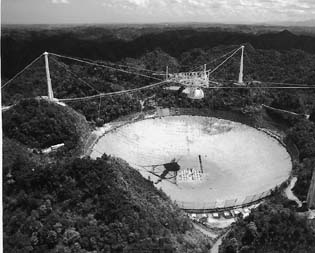Personal tools
News from ICTP 93 - Commentary

The search for extraterrestrial life-from simple organisms to intelligent beings-is one of the most fascinating fields of science.
Life Beyond?
Does life exist beyond our planet and, if so, is that life comparable to the life forms we know here on Earth? These are questions that ICTP has been involved in since the Centre launched its first conference on "chemical evolution and the origin of life" nearly a decade ago. The Centre's focus on this subject will continue this year with the Sixth Trieste Conference on Chemical Evolution: First Steps in the Origin of Life in the Universe, to be held at the Adriatico Guesthouse on 18-22 September.
Three strategies have been devised in the search for extraterrestrial
life: the study of the cellular makeup of exotic organisms on
Earth; the search for organic matter and living micro-organisms
beyond Earth; and the use of radiotelescopes to detect signals
of intelligent life in the heavens above.
The first strategy has focussed on understanding how life began
on Earth. Research has concentrated on the makeup of exotic organisms
living in such inhospitable environments as ocean-floor bottoms,
glacial lakes, and volcanic lava streams--all of which display
temperatures and pressures that may have been present during the
Earth's formation about 4 billion years ago. The research not
only broadens our appreciation of the enormous diversity of life
here on Earth, but helps us understand the environmental extremes
that simple organisms can tolerate. Such extremes may be found
on other celestial bodies, making it more probable that life can
exist there.
The second strategy for deciding if we are not alone in the universe
is the search for the simplest forms of organic matter--aminoacids
or proteins--that may be embedded in the ancient rock of planets,
comets or meteorites, or suspended in the soupy mixture of interstellar
clouds. The search has focussed on three celestial bodies: Mars,
Europa (a moon of Jupiter), and Titan (a moon of Saturn).
For now, interest has shifted toward discovering fossilised remnants
of life that existed billions of years ago when our solar system
was an extremely violent environment in which only extremophilic
organisms (those that withstand extreme pressures and temperatures)
could survive. One of the primary goals of this extraterrestrial
search is to determine whether life ever existed in places other
than Earth and, if so, what were the environmental conditions
that made it possible.

The radiotelescope at Arecibo
The third strategy used in the hunt for life beyond Earth relies
on radiotelescopes such as the huge telescope at the National
Astronomy and Ionosphere Center in Arecibo, Puerto Rico, USA.
These 'mega-dishes' actually have two roles to play: First and
foremost, they help to examine wavelengths that cannot be seen
by the human eye--for example, radiowaves and microwaves. Such
information has proven essential for understanding the movement
and behaviour of planets, stars and galaxies. Second, radiotelescopes
seek anomalies in microwaves and radiowaves wafting across the
universe. Such anomalies may represent the imprint of intelligent
life in the heavens beyond.
Astronomers have been scanning the micro- and radiowave spectrum
for four decades with no reliable signal from an extraterrestrial
civilisation. But that doesn't mean the initiative is likely to
be abandoned. The public's fascination with the search for extraterrestrial
life, combined with the vast reaches of outer space, where Earth-bound
scientific research continues to uncover new extrasolar planets
and even solar systems, keeps hope alive that 'somewhere out there'
intelligent life exists that will some day send us a signal. If
a signal is ever received, this much is certain: It will be one
of the most remarkable and influential discoveries ever made,
with profound implications for science, philosophy and even theology.
Julian Chela-Flores
ICTP Staff Associate
Physics of the Living State
For additional information about the Sixth Trieste Conference on Chemical Evolution: First Steps in the Origin of Life in the Universe, see http://www.ictp.it/~chelaf/trieste2000.